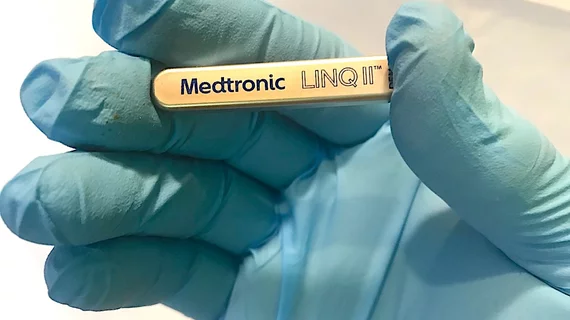FDA grants new pediatric indication for Medtronic Linq II implantable cardiac monitor
The U.S. Food and Drug Administration (FDA) has granted the first pediatric indication for an implantable cardiac monitor to Medtronic. The Linq II Insertable Cardiac Monitor (ICM) system is the first such device to receive 510(k) clearance for use in pediatric patients over the age of 2 who have heart rhythm abnormalities and require long-term, continuous monitoring.
"For pediatric cardiologists who see many young patients needing continuous, long-term monitoring for infrequent or unknown heart rhythm conditions, this expanded indication for the Linq II ICM is critically important,” Jennifer Silva, MD, director of pediatric cardiac electrophysiology at Washington University in St. Louis and St. Louis Children’s Hospital, said in a statement. "The data generated from these small monitors can help us better tailor treatment decisions and ongoing management for our patients.”
Using the Linq II device, physicians will be able to gather actionable data to help diagnose underlying heart conditions and heart rhythms to define treatment protocols in younger patients. It can also give parents peace of mind knowing their child’s heart is being monitored continuously, and that their doctor will be notified of abnormal heartbeats.
What is the Linq II ICM device?
The Linq II system is about one-third the size of a AAA battery. It is a wireless ICM for patients with abnormal heart rhythms who experience infrequent symptoms including dizziness, palpitations, syncope and chest pain who require long-term monitoring. The battery life lasts of up to 4.5 years. The system also allows patients to undergo magnetic resonance imaging (MRI). Unlike external monitors, the implantable device does not interfere with daily activities such as bathing or swimming.
The system integrates with remote patient management, so patients or their caregivers can use their smartphones to automatically transfer device data using the MyCareLink Heart mobile app via Bluetooth connection.
The latest version of the Linq system has been implanted in thousands of patients globally since it was first commercialized in 2020.
Medtronic recently launched the AccuRhythm AI algorithms for the Linq II, which applies artificial intelligence (AI) to heart rhythm event data collected. The vendor said this helps the accuracy of information physicians receive so they can better diagnose and treat abnormal heart rhythms. Medtronic said the two AI algorithms have been shown to reduce the number of false alerts specific to the most common ICM false alerts — atrial fibrillation (AF) and pause (asystole) — by 74.1% and 97.4% respectively,[1,2] while preserving more than 99% of true alerts.

